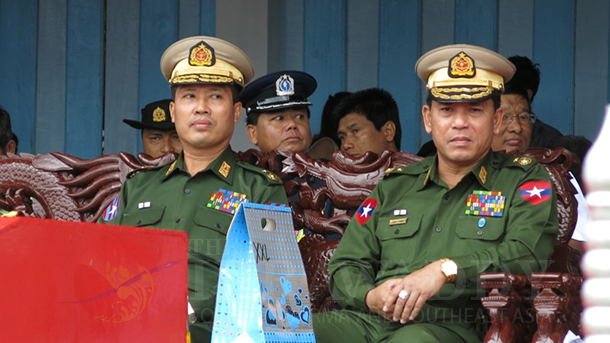RANGOON — Arakanese lawmakers said they are worried that a Burma Army general will become the replacement for the Arakan State chief minister who resigned last week, adding that they want to decide who becomes the next minister because they are the majority party in the state.
President Thein Sein announced last week that Hla Maung Tin, the chief minister of strife-torn Arakan State, was “allowed to resign,” but no details were provided as to why the lawmaker of the ruling Union Solidarity and Development Party (USDP), who was appointed in 2010, stepped down.
The President’s Office on Friday it announced that Deputy Border Affairs Minister Gen. Maung Maung Ohn will become a member of the Arakan State legislature.
The Arakan National Party (ANP) said they believe that he will be appointed as the new chief minister on Wednesday during a meeting of the state parliament.
“They are calling us for an urgent meeting tomorrow so I know we will have to discuss that Gen. Maung Maung Ohn will become the next chief minister,” said Aung Mrya Kyaw, a local ANP lawmaker, adding that this procedure had been used in the past to appoint a chief minister.
The general headed the government commission that investigated the Sittwe riots in March, during which more than a dozen UN and humanitarian aid groups offices were ransacked by Arakanese Buddhist mobs.
The ANP demand, however, that lawmakers in the state legislature—where the ANP holds 18 of the 34 seats—are consulted over the appointment.
“The best thing to do is to let our 34 civilian MPs here appoint a chief minister, instead of [letting the government] choosing someone from the army,” Aung Mrya Kyaw said. “Because those who come from the army do not understand the whole situation here, and it could even become worse if the army manages it.”
Burma’s military-drafted 2008 Constitution centralizes executive powers over the divisions and ethnic states with the government in Naypyidaw, which has the authority to directly appoint a region’s chief minister.
The ANP demands that local lawmakers are consulted and that an ANP lawmaker is chosen as the new chief minister because their party holds the majority.
“We should have the right to decide who will run our state, but this Constitution does not let us decide this,” Aung Mrya Kyaw said. “We ethnic [groups] ask for amendments to this Constitution because it currently does not let ethnic people run their own states.”
“In a democratic system, only those who are elected can be appointed as chief minister. So we disagree to appoint Gen. Maung Maung Ohn,” added Khin Maung Gyi, an ANP central committee member.
Under the former military regime, senior military officers held all positions in the cabinet and ran Burma’s states and divisions as chief ministers. Under the current nominally civilian government, the army controls the Border Affairs, Home Affairs and Defense ministries.
Ethnic minority groups have long fought a political and armed struggle against the Burman-majority army and central government in order to seek greater political autonomy, cultural rights and control over natural resources in their regions.
Since 2012, Arakan State has experienced waves of deadly inter-communal violence between Arakanese Buddhist majority and the Rohingya Muslims, a stateless minority of around 1 million people who suffer gross human rights violations at the hands of security forces, government authorities and Arakanese nationalists.
International human rights groups have accused the Burmese government of colluding with Arakanese nationalist groups during the attacks on the Rohingya, and contributing to the ethnic cleansing of the Muslim group from communities in northern Arakan State.
Some 140,000 displaced Rohingya live in crowded camps from where they cannot leave, while about 89,000 Rohingya fled by boats last year in a desperate attempt to reach Malaysia.

















